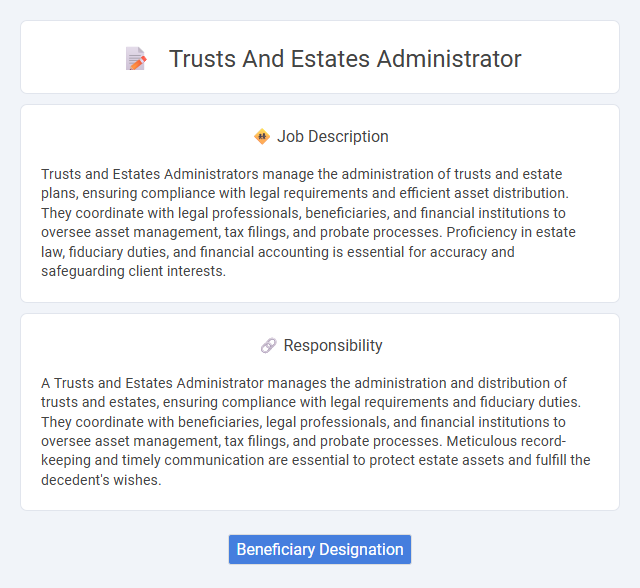
Trusts and Estates Administrators manage the administration of trusts and estate plans, ensuring compliance with legal requirements and efficient asset distribution. They coordinate with legal professionals, beneficiaries, and financial institutions to oversee asset management, tax filings, and probate processes. Proficiency in estate law, fiduciary duties, and financial accounting is essential for accuracy and safeguarding client interests.
Individuals who demonstrate strong organizational skills and attention to detail are likely well-suited for a Trusts and Estates Administrator role. Candidates who are comfortable managing sensitive financial and legal information and possess excellent communication abilities may find this position aligns with their strengths. People with a high level of integrity and the ability to work under pressure could have a higher probability of thriving in this job.
Qualification
A Trusts and Estates Administrator must possess a strong background in estate planning, trust administration, and probate law, often requiring a bachelor's degree in finance, law, or related fields. Professional certifications like Certified Trust and Fiduciary Advisor (CTFA) or Certified Estate Planner (CEP) enhance credibility and expertise in managing fiduciary responsibilities. Proficiency in financial analysis, regulatory compliance, and excellent organizational skills are critical for overseeing asset management and ensuring accurate estate settlements.
Responsibility
A Trusts and Estates Administrator manages the administration and distribution of trusts and estates, ensuring compliance with legal requirements and fiduciary duties. They coordinate with beneficiaries, legal professionals, and financial institutions to oversee asset management, tax filings, and probate processes. Meticulous record-keeping and timely communication are essential to protect estate assets and fulfill the decedent's wishes.
Benefit
A Trusts and Estates Administrator likely enhances client satisfaction by efficiently managing asset distribution and ensuring legal compliance. Their expertise probably minimizes the risk of disputes and costly delays, protecting the estate's value. This role may also streamline the probate process, providing clarity and peace of mind for beneficiaries.
Challenge
Managing trusts and estates is likely to present considerable challenges due to the complex legal and financial regulations involved. Conflicting interests among beneficiaries may require nuanced mediation skills and a keen understanding of fiduciary duties. Navigating probate processes while ensuring compliance and timely distribution probably demands exceptional attention to detail and problem-solving capabilities.
Career Advancement
Trusts and Estates Administrators oversee the management and distribution of assets according to legal and fiduciary requirements, gaining expertise in estate law, taxation, and financial planning. Career advancement often involves progressing to senior fiduciary roles, such as Trust Officer or Estate Planning Manager, by developing skills in client relations, regulatory compliance, and complex estate administration. Earning certifications like Certified Trust and Fidiciary Advisor (CTFA) or pursuing advanced degrees in law or finance enhances promotion prospects and leadership opportunities within wealth management firms.
Key Terms
Beneficiary Designation
A Trusts and Estates Administrator manages beneficiary designations to ensure assets are correctly allocated according to legal and client specifications. Precise beneficiary designation prevents probate delays and minimizes tax liabilities by directing funds efficiently within trusts and estate plans. Expertise in updating and verifying beneficiary information maintains compliance with state laws and protects the interests of heirs and beneficiaries.
 kuljobs.com
kuljobs.com